

Informative Essay
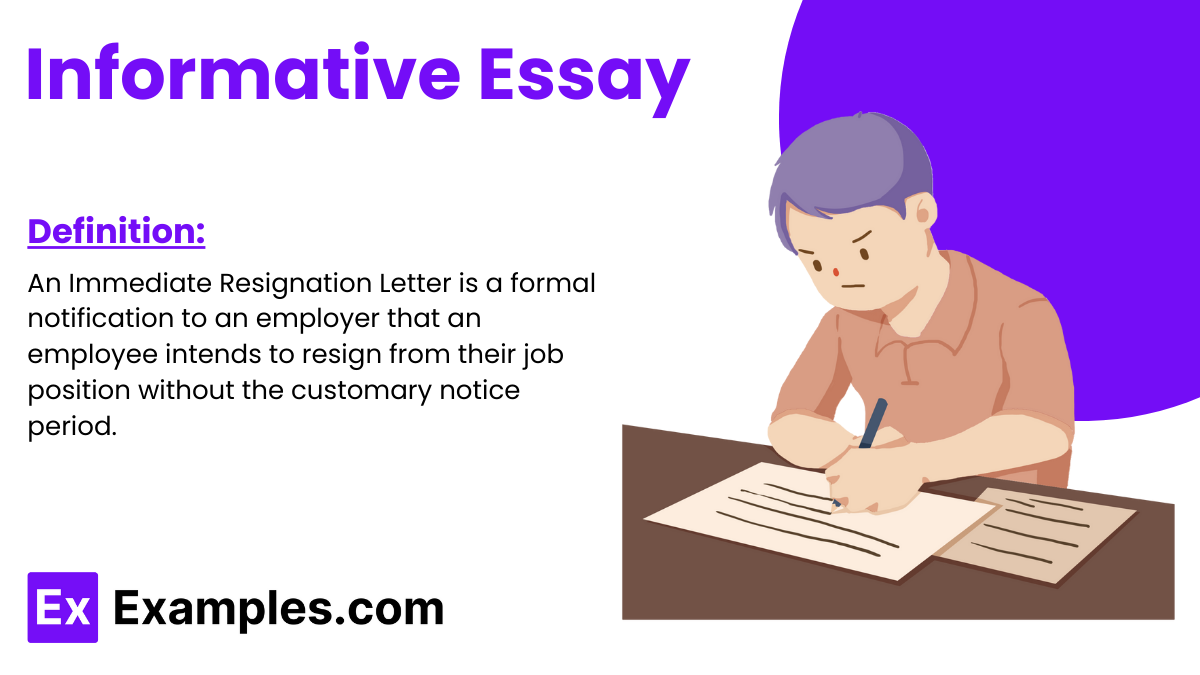
An Informative Essay stands out in the academic world as a tool for students to elaborate on specific topics with depth and clarity. By incorporating factual details and supporting evidence, these essays educate and enlighten the reader. This guide, enriched with practical essay examples , is tailored to assist students in mastering the art of crafting compelling and informative essays. Whether for school assignments or personal exploration, these examples provide valuable insights into effective informative essay writing.
What is an Informative Essay?
An informative essay is a genre of writing aimed at educating the audience on a particular topic or subject. This type of essay doesn’t just offer facts but also provides insights and explanations to help readers understand the subject matter more deeply. Unlike persuasive essays, which aim to convince readers of a particular viewpoint, informative essays are neutral; they do not express the writer’s personal opinions or arguments.
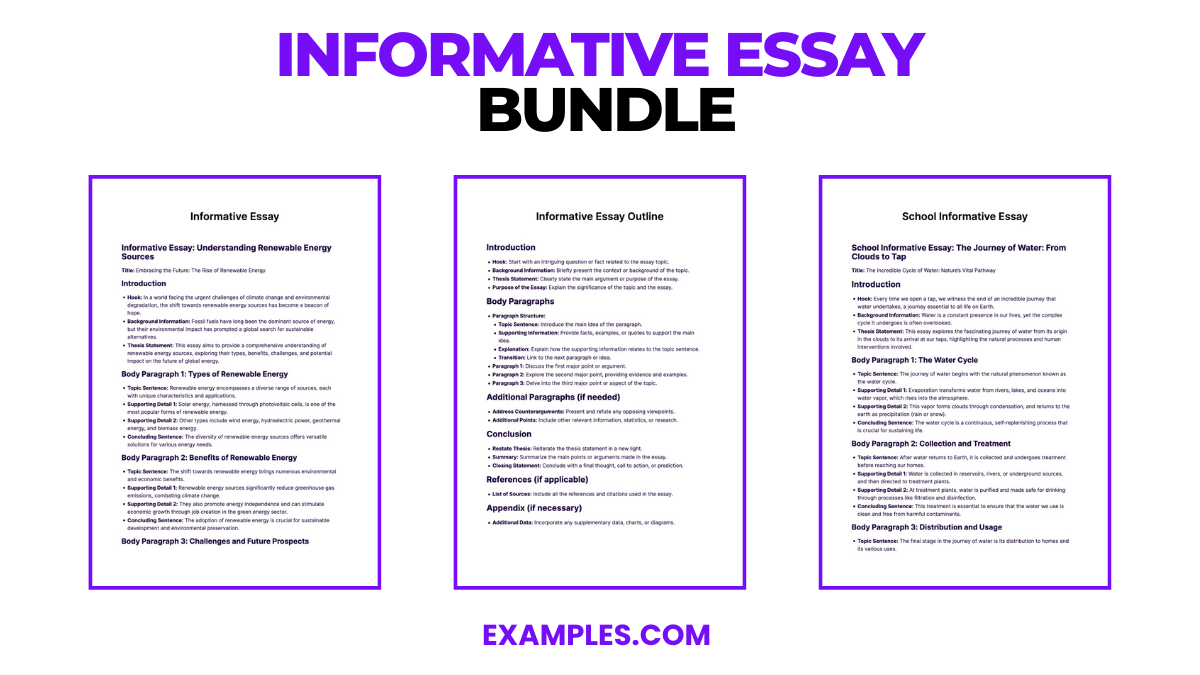
Download Informative Essay Bundle
You may have already been flooded with all these load of essays that your teacher asked you to write. You are probably thinking of a clever way on how to get away from the situation where you probably have not ever dreamed of. However, it is a task that we should all be thankful for. Essay writing actually brings more benefits than browsing through those social media platforms that you have already memorized. It does not only sharpen your minds and makes you more creative than putting likes and hitting shares of your friends’ post. The ability to share something from your mind is definitely a plausible act.
Informative Essay Format
Crafting an informative essay requires a structured approach to organize the wealth of information in a way that’s easily understandable to the reader. The format of an informative essay typically consists of three main parts: the introduction, the body, and the conclusion. Following this format helps in developing a coherent and logically flowing essay that effectively informs the reader.
Introduction
The introduction sets the stage for the entire essay. It should start with a hook that grabs the reader’s attention, such as a surprising fact, a question, or a vivid description of the topic. Following the hook, provide some background information to help readers understand the context of the essay. Finally, the introduction should end with a clear and concise thesis statement that outlines the main points or aspects of the topic that will be discussed. This statement acts as a roadmap for the essay, guiding the reader through the information presented.
Components of the Introduction: Hook : Engages the reader’s interest. Background Information : Provides context for the topic. Thesis Statement : Outlines the main points to be discussed.
Body Paragraphs
The body of an informative essay is where the main information is presented. It should be divided into paragraphs, with each paragraph focusing on a specific point or aspect of the topic. Start each paragraph with a topic sentence that introduces the point to be discussed. Follow this with supporting details, such as facts, examples, statistics, and quotes from credible sources. Each paragraph should be coherent and focused, contributing to the overall argument or presentation of the topic.
Structure of Body Paragraphs: Topic Sentence : Introduces the main idea of the paragraph. Supporting Details : Facts, examples, and evidence supporting the topic sentence. Transition : Smoothly connects to the next paragraph or point.
The conclusion of an informative essay wraps up the essay by summarizing the main points discussed. It should restate the thesis statement in a new way, reflecting the information presented in the essay. The conclusion can also highlight the importance or relevance of the topic, offering final insights or thoughts for the reader to consider. This section should leave the reader with a clear understanding of the topic and its significance. Elements of the Conclusion: Restatement of Thesis : Reflects the main points made in the essay. Summary of Main Points : Briefly recaps the key information discussed. Final Insight : Offers closing thoughts or implications of the topic.
Formatting Tips:
Use clear and concise language throughout the essay. Ensure each paragraph flows logically to the next. Cite sources where necessary to back up facts and claims. Keep the essay focused on informing the reader, avoiding personal opinions.
Types of Informative Essay
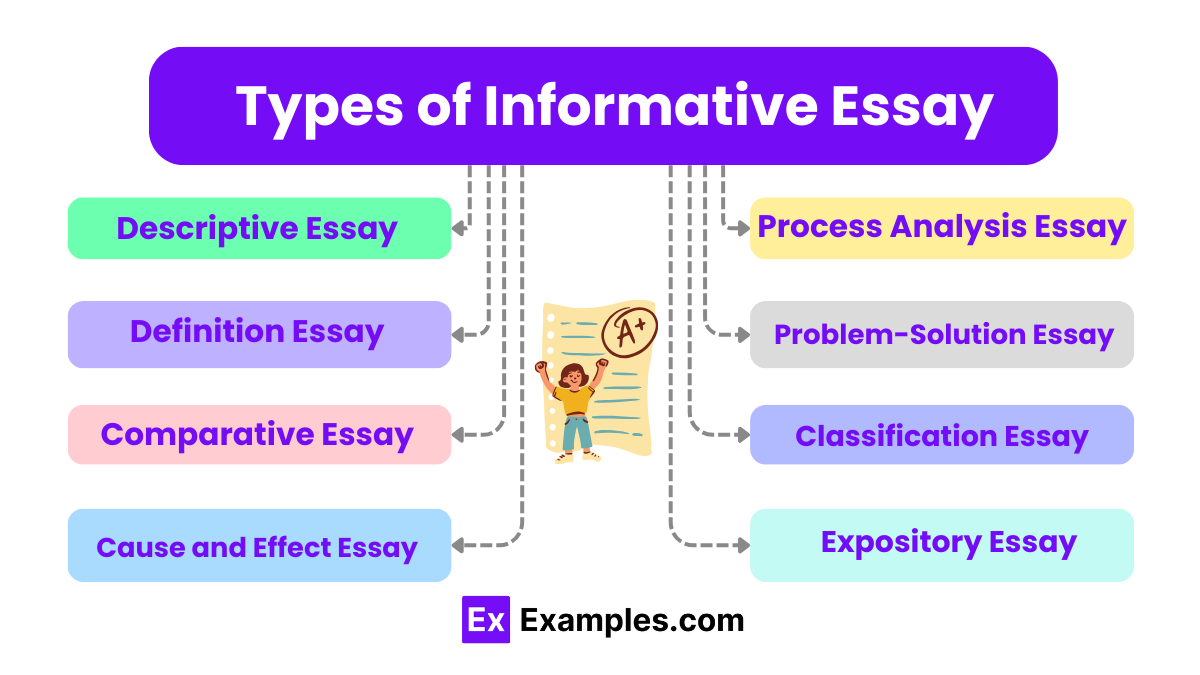
Download This Image
- Descriptive Essay : Provides a detailed description of a person, place, object, or event, using sensory details to paint a vivid picture for the reader.
- Definition Essay : Explores the meaning, history, and implications of a complex concept or term, offering a deep and thorough understanding beyond basic definitions.
- Compare and Contrast Essay : Analyzes two or more subjects by comparing their similarities and contrasting their differences, highlighting the nuances between them.
- Cause and Effect Essay : Examines the reasons why something happened (cause) and the outcomes that followed (effect), aiming to establish a clear relationship between events.
- Process Analysis Essay : Explains how something is done, how something occurs, or how something works, in a step-by-step format, providing clear instructions or insights.
- Problem-Solution Essay : Identifies a specific problem and proposes one or more solutions, focusing on presenting viable and effective ways to address the issue at hand.
- Classification Essay : Organizes or sorts different subjects or objects into categories based on shared characteristics, providing a clear understanding of their relationships and differences.
- Expository Essay : Presents a balanced analysis of a topic, using facts, statistics, and examples, aiming to explain or clarify a subject in a straightforward, unbiased manner.
How is an Informative Essay Structured?
An informative essay is structured in a clear, organized manner to effectively convey information to the reader. This structure consists of three main parts: the introduction, the body paragraphs, and the conclusion. Here’s how each part is typically organized:
- Hook : Begins with a captivating opening to grab the reader’s attention. This could be an interesting fact, a question, or a startling statistic related to the topic.
- Background Information : Provides context for the topic being discussed. This section gives the reader any necessary background information to understand the essay.
- Thesis Statement : Concludes the introduction with a clear, concise statement that outlines the main points or focus of the essay. This statement guides the rest of the essay.
- Topic Sentence : Each body paragraph starts with a topic sentence that introduces the main idea of the paragraph, relating back to the thesis statement.
- Supporting Details : These are facts, examples, or explanations that provide evidence to support the topic sentence. This may include statistics, quotes from credible sources, or logical arguments.
- Analysis : This section interprets the supporting details, explaining how they relate to the topic and the thesis statement. It’s where the writer’s insight comes into play, providing depth to the information presented.
- Transition : Each paragraph ends with a sentence that provides a smooth transition to the next paragraph, maintaining the flow of the essay.
- Summary of Main Points : Begins by briefly summarizing the key points or information presented in the body paragraphs, reinforcing the essay’s main ideas.
- Restatement of the Thesis : Reiterates the thesis statement in light of the information and analysis provided, emphasizing the essay’s main argument or focus.
- Closing Statement : Concludes with a final thought or call to action, leaving the reader with something to ponder or suggesting steps for further exploration of the topic
7 steps for Writing an Informative Essay
- Choose Your Topic : Select a topic that interests you and meets the assignment’s criteria. Ensure it is broad enough to research but narrow enough to be covered in your essay.
- Conduct Research : Gather information from reliable sources to understand your topic thoroughly. Look for facts, statistics, and examples that will provide a solid foundation for your essay.
- Create an Outline : Organize your thoughts and research into an outline. This will help structure your essay logically, ensuring a clear flow of ideas from the introduction through the body paragraphs to the conclusion.
- Write the Introduction : Begin with a hook to capture the reader’s interest, followed by background information to set the context for your topic. Conclude the introduction with a thesis statement that presents the main focus or argument of your essay.
- Develop Body Paragraphs : Each paragraph should focus on a single main idea that supports your thesis. Start with a topic sentence, followed by evidence and examples. Include your analysis to explain how this evidence relates to your topic.
- Conclude Your Essay : Summarize the main points of your essay, restate your thesis in light of the information provided, and offer a final thought or call to action. This is your chance to reinforce the importance of your topic and the information you’ve presented.
- Revise and Edit : Review your essay for any errors or unclear parts. Check for grammar, punctuation, and spelling mistakes. Ensure your writing is clear, concise, and logically organized. It may help to get feedback from others or to step away from your essay for a while before reviewing it again.
Purpose of Informative Essays
Informative essays serve a foundational role in educational and communication contexts, aiming to enlighten the reader on a specific topic or subject matter. The core purpose of these essays is to inform, explain, and educate without presenting the author’s opinion or persuading the reader to adopt a particular viewpoint. Here’s a deeper look into the primary objectives of informative essays:
Educate the Reader
The most direct purpose of an informative essay is to educate its audience. By presenting facts, data, and detailed explanations, the essay seeks to expand the reader’s knowledge on a given subject. This is particularly valuable in academic settings, where understanding diverse topics is essential to a well-rounded education.
Provide Clarity and Insight
Informative essays often tackle complex subjects that may be difficult to understand at first glance. Through clear writing and structured explanation, these essays break down intricate concepts into digestible parts, offering insight and clarity. They help the reader grasp the nuances of topics ranging from scientific theories to historical events and beyond.
Enhance Critical Thinking
By presenting information from various angles and including detailed analyses, informative essays encourage readers to engage in critical thinking. Readers are prompted to consider the hows and whys of the subject matter, analyze the information presented, and connect it to broader contexts or their personal knowledge.
Stimulate Interest
Although the primary aim is to inform, a well-crafted informative essay can also spark interest in the topic. By uncovering intriguing facts or presenting the subject in a compelling manner, the essay can motivate readers to explore the topic further on their own, fostering a culture of learning and curiosity.
Support Academic and Professional Success
In academic settings, informative essays are a tool for students to demonstrate their understanding of a topic, their ability to conduct thorough research, and their proficiency in communicating complex ideas. Professionally, these essays contribute to knowledge sharing within industries, helping individuals stay informed about current trends, innovations, and foundational concepts.
Build Foundation for Further Exploration
Informative essays lay the groundwork for deeper research and exploration. By providing a comprehensive overview of a topic, they equip readers with the basic knowledge necessary to delve into more specialized studies or related subjects, serving as a stepping stone for academic and personal growth.
10+Informative Essay Samples
15+ informative essay examples.
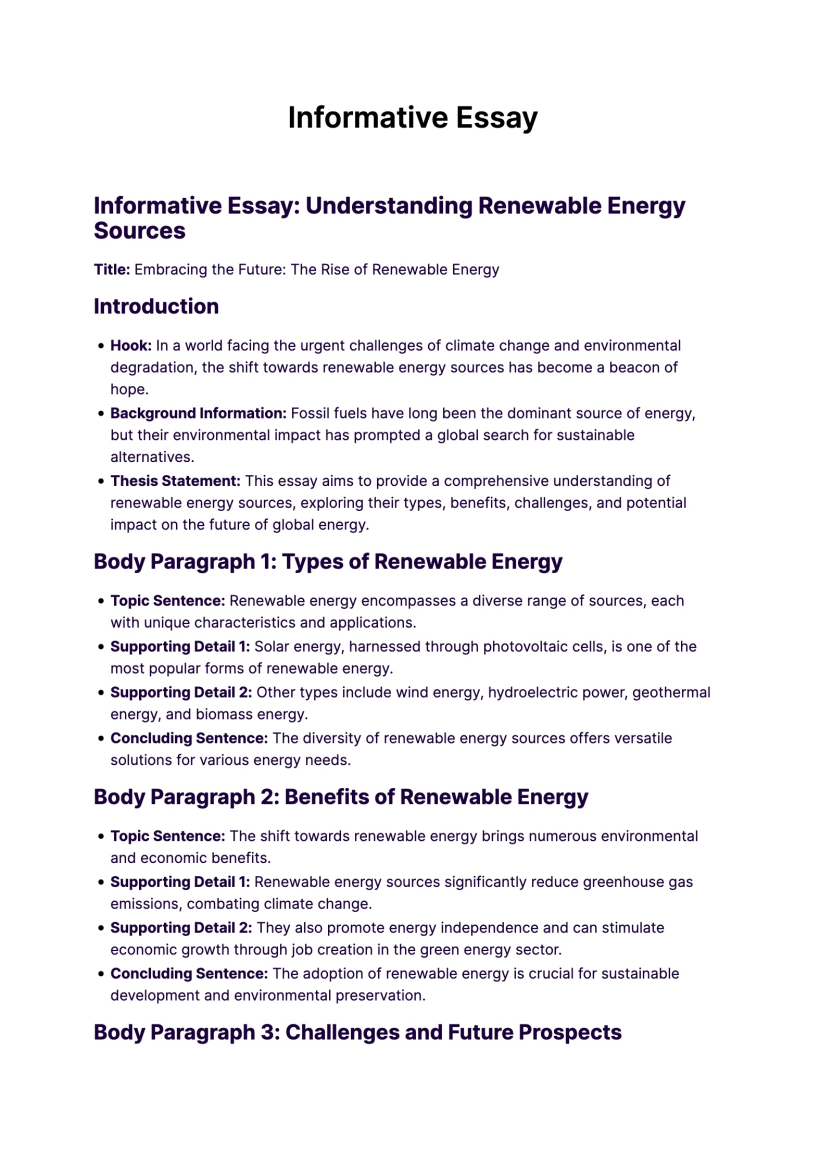
Free Download
Informative Essay Outline
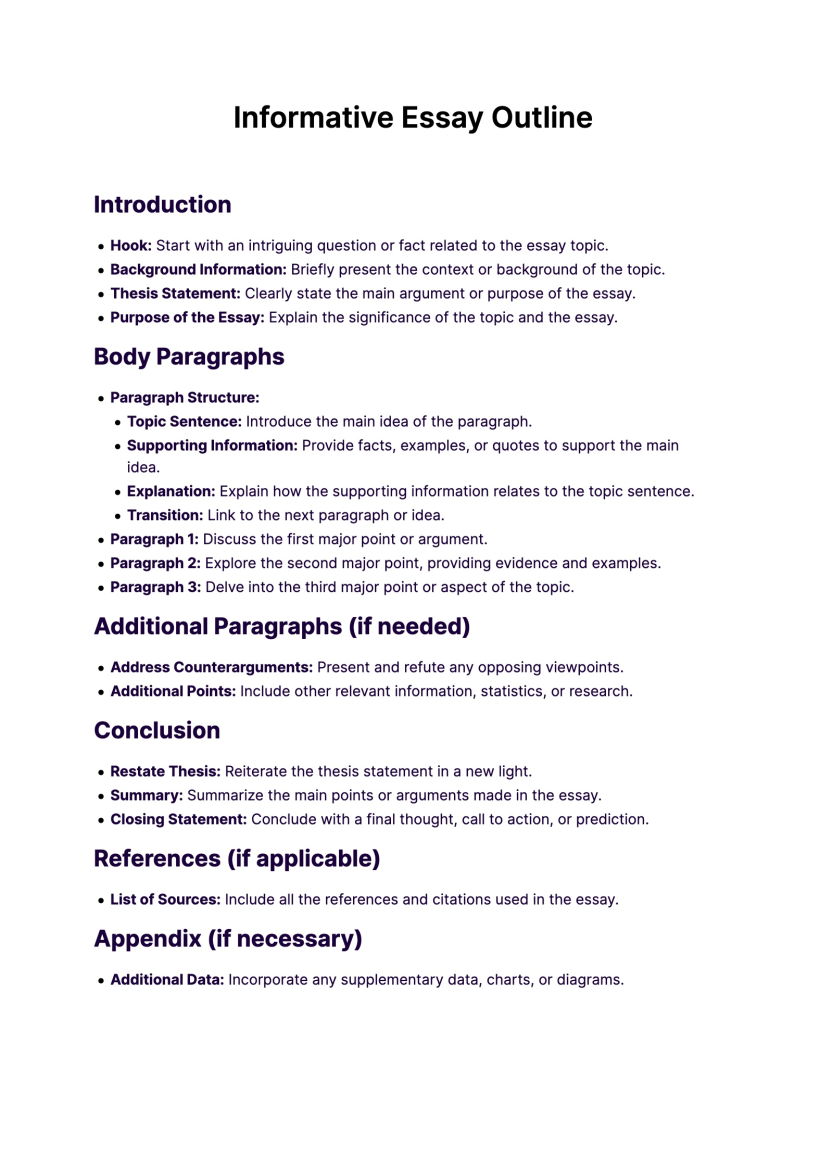
School Informative Essay
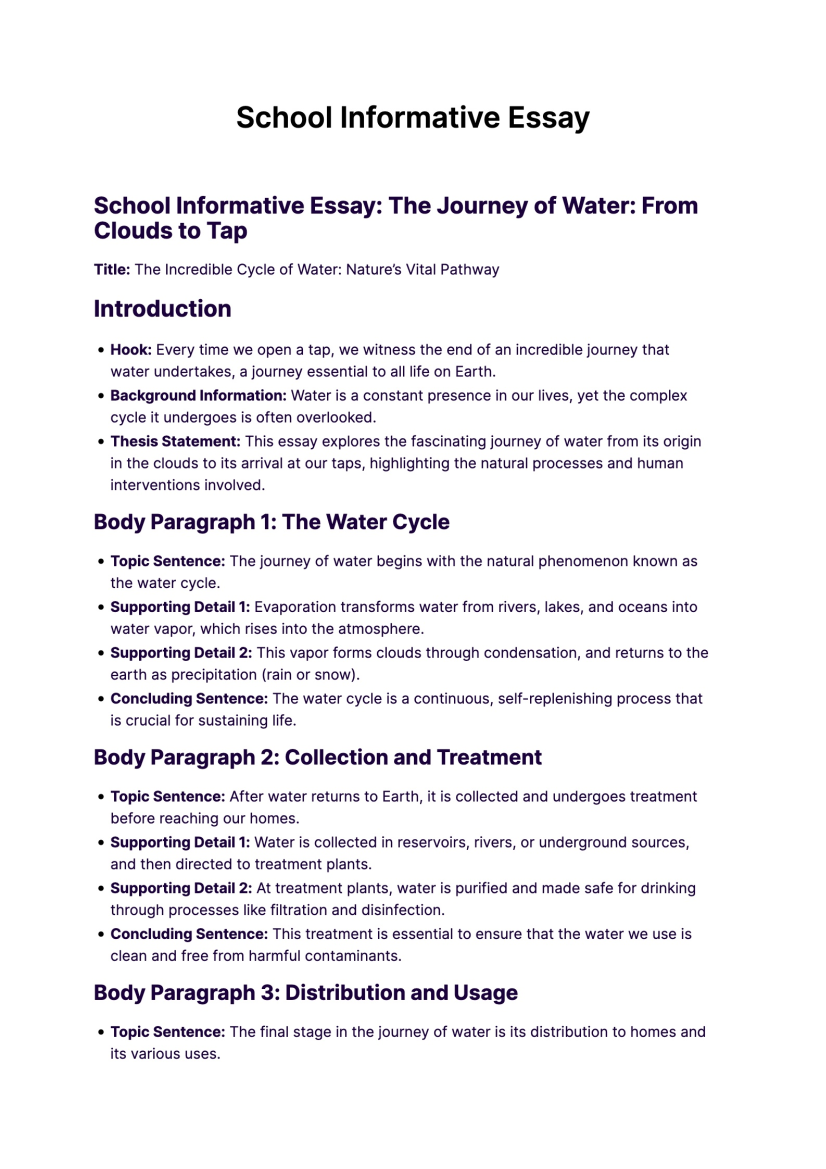
Informative Essay Example
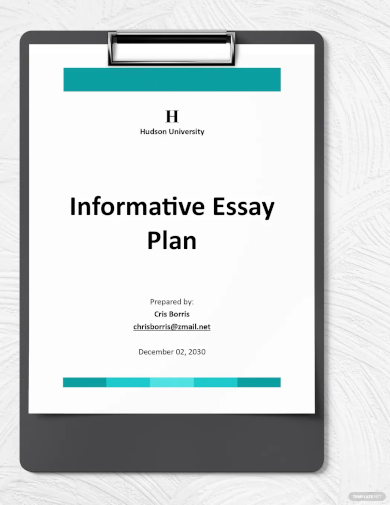
Expository Informative Example
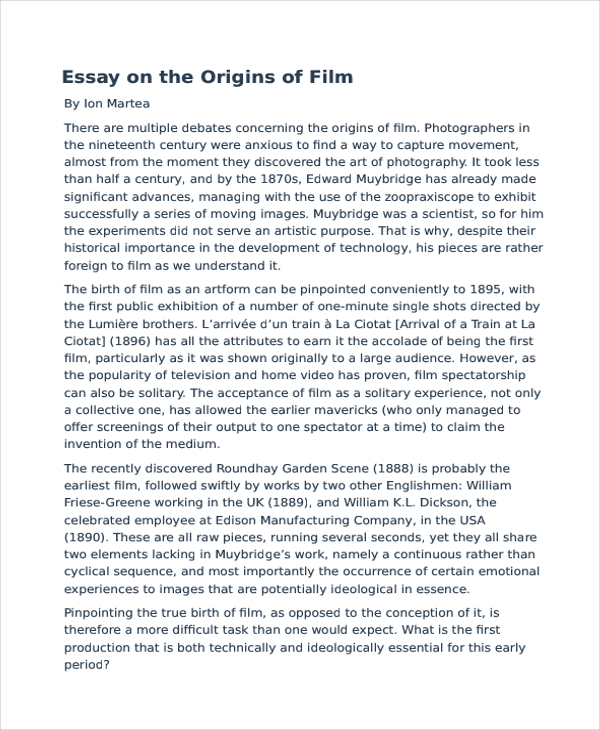
Student Informative Sample
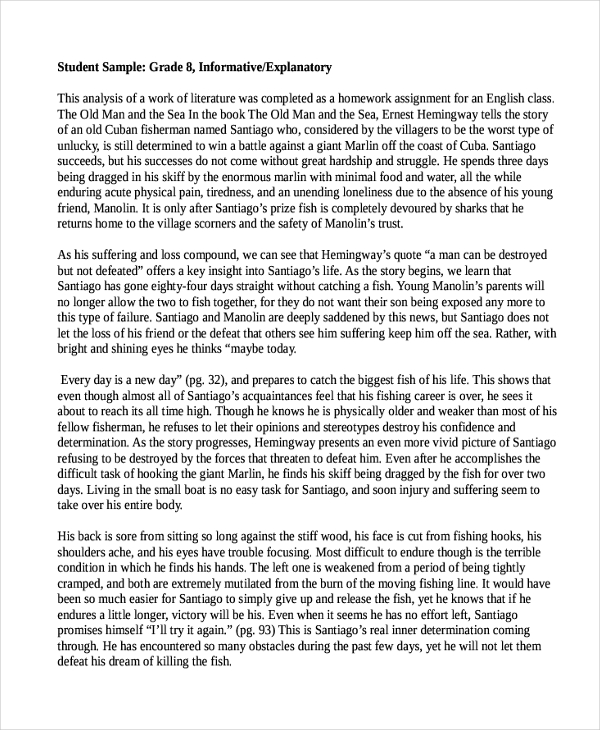
Short Informative Essay
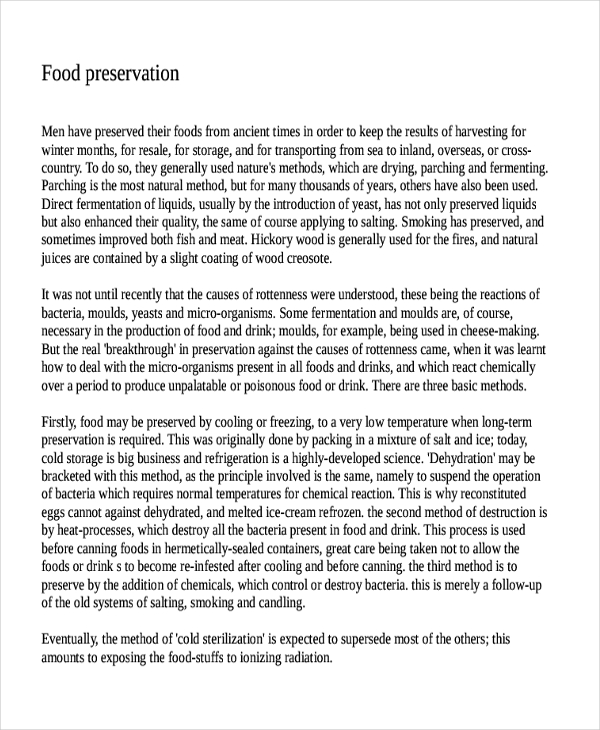
What Is an Informative Essay?
Informative essay is a written as literary essay piece with the purpose of educating a target audience or readers regarding a certain topic or subject.
It is intended to present or expose something while at the same time avoiding to present arguments or personal opinion from the writer. An informative essay is also sometimes called an expository essay in the sense that it also aims to expose or display an information which will be beneficial for the reader.
It does not present bias judgments nor favorable ideas. It does not also dwell in the concept of convincing readers to do things that are contrary to their will.
How to Write an Informative Essay
Writing an informative essay is like telling a blind person what is the color of the sky or telling a kid what are ice creams made of. You simply just have to present a topic and expand.
- Think of a topic. The first thing that you have to do is think of a topic that you want to right about. It would be good if it is something that you are most passionate about so you can write in great details.
- Create a format. The most effective format is using the essential parts of an essay .
- Present your ideas. After choosing the topic, start writing your ideas. Try to present it in a way that you are educating the readers.
College Informative Essay
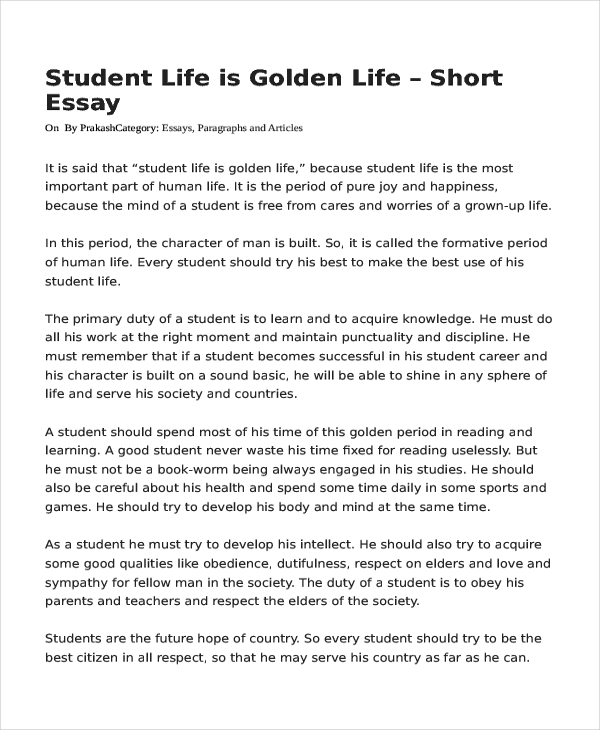
Middle School Informative

Narrative Informative Example
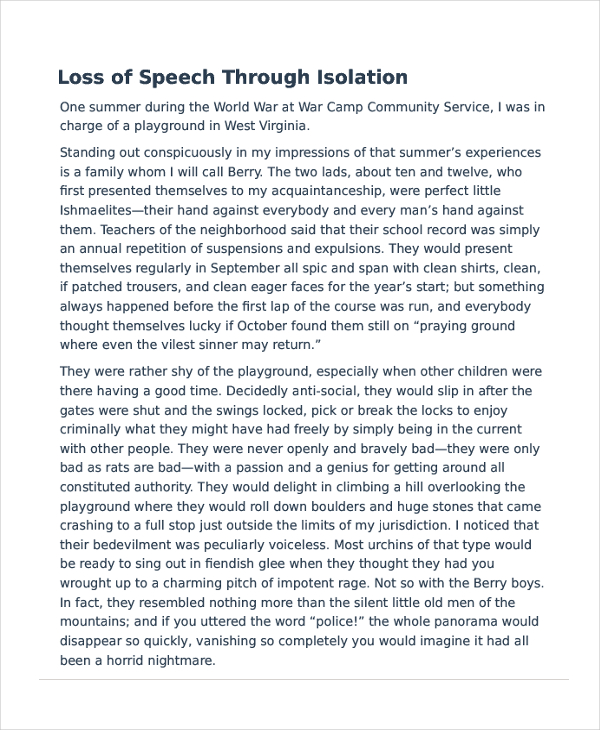
Informative Essay Example
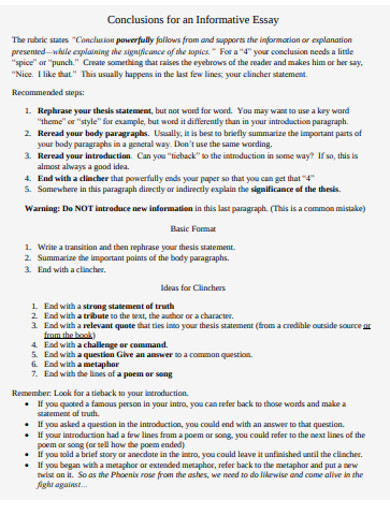
Sample Informative Essay
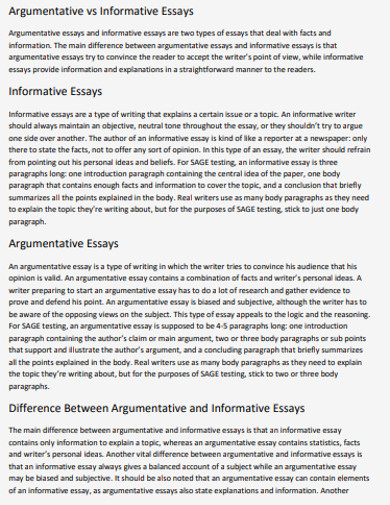
Informative Organizer Essay
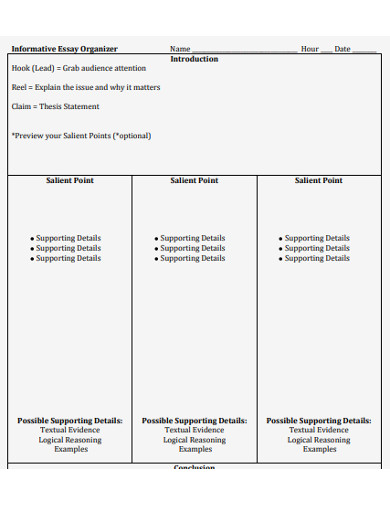
Informative Assignment Essay
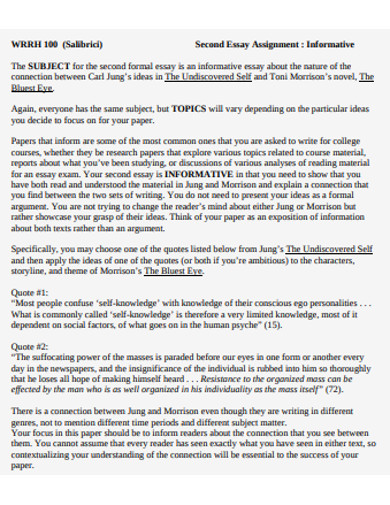
Uses of Informative Essay
1. educational tools.
- Learning and Teaching : Informative essays are widely used in educational settings to teach students about specific topics. They serve as a means for students to research, organize, and present information, enhancing their learning process. For educators, these essays are a tool to assess students’ understanding and ability to communicate knowledge effectively.
2. Enhancing Understanding
- Complex Concept Clarification : These essays break down complex concepts into more understandable parts, making it easier for readers to grasp difficult subjects. They can demystify scientific principles, historical events, or technological advancements, providing clarity and insight.
3. Communication of Ideas
- Knowledge Sharing : In professional and academic communities, informative essays facilitate the sharing of knowledge and ideas. They allow experts to communicate findings, theories, and analyses, contributing to the collective understanding of a field.
4. Awareness and Information Dissemination
- Public Awareness : Informative essays play a crucial role in raising awareness about important issues, such as health, environmental concerns, and social justice. By presenting facts and information, they help inform public opinion and encourage informed decision-making.
5. Basis for Further Research
- Foundation for Exploration : These essays provide a foundation for further research. By offering a comprehensive overview of a topic, they can inspire readers to explore subjects in greater depth, paving the way for advanced studies and discoveries.
6. Professional Development
- Skill Enhancement : Writing informative essays helps individuals develop valuable skills, including research, critical thinking, organization, and writing. These skills are essential in many professional contexts, enhancing career prospects and professional competence.
7. Decision Making and Problem Solving
- Informed Decisions : In the business world and personal life, informative essays can provide the necessary background to make informed decisions. Understanding all aspects of a situation or topic can lead to better problem-solving strategies and outcomes.
8. Cultural and Social Engagement
- Cultural Insight : Essays about cultural practices, societal trends, and historical backgrounds offer readers insights into different ways of life and perspectives, promoting cultural understanding and empathy.
9. Personal Growth
- Intellectual Stimulation : Reading and writing informative essays can be intellectually stimulating, encouraging curiosity and a love for learning. They can broaden one’s horizons and foster a more informed and thoughtful perspective on the world.
Importance of Informative Essay
- Facilitates Learning and Education : They are essential tools in educational settings, helping students learn and understand various topics across different subjects.
- Promotes Critical Thinking : Writing and reading informative essays encourage critical thinking by requiring analysis and synthesis of information.
- Enhances Research Skills : The process of writing an informative essay improves research skills, teaching individuals how to gather, evaluate, and organize information effectively.
- Improves Writing and Communication Skills : Informative essays help in honing writing skills, including structuring arguments, maintaining clarity, and engaging the audience with informative content.
- Encourages Intellectual Curiosity : They stimulate curiosity about the world, encouraging readers and writers to explore topics deeply and broadly.
- Supports Informed Decision Making : By presenting facts and data, informative essays enable readers to make decisions based on knowledge and insights rather than assumptions or misinformation.
- Builds a Foundation for Further Study : They lay the groundwork for more in-depth research and analysis, serving as a stepping stone to more specialized studies.
- Spreads Awareness on Important Issues : Informative essays are a powerful medium for raising awareness about social, environmental, and health-related issues, contributing to public education and action.
- Promotes Cultural Understanding and Empathy : Essays on cultural and societal topics promote understanding and empathy towards different communities and ways of life.
- Contributes to Professional Development : The skills gained from researching and writing informative essays are valuable in professional settings, enhancing abilities in documentation, presentation, and critical analysis.
- Serves as a Source of Inspiration : Reading informative essays can inspire new ideas, hobbies, or even career paths by introducing readers to previously unknown subjects or deeper aspects of familiar topics.
- Facilitates Clear and Effective Information Dissemination : In both academic and professional contexts, the ability to clearly and effectively disseminate information is critical, and informative essays are an excellent medium for this purpose.
How Do You Start an Informative Essay Sentence?
Start an informative essay sentence with a hook such as a surprising fact, a question, or a quote to grab the reader’s attention and draw them into the topic.
How Do You Structure an Informative Essay?
Structure an informative essay with an introduction that includes a hook and thesis statement, body paragraphs that explore the topic in detail, and a conclusion that summarizes the main points.
What Should Each Body Paragraph Begin With?
Each body paragraph should begin with a topic sentence that introduces the main idea of the paragraph, directly supporting the thesis statement.
What Are the Informative Writing Techniques?
Informative writing techniques include using clear and concise language, organizing information logically, employing facts and data for support, and incorporating visuals like charts or graphs to enhance understanding.
How Do You Start an Informative Letter?
Start an informative letter with a polite greeting, followed by a clear introduction of the purpose of the letter. Provide the necessary information in a concise and organized manner.
What Are the Parts of an Informative Essay?
The parts of an informative essay include the introduction with a hook and thesis statement, body paragraphs with topic sentences and supporting details, and a conclusion that summarizes the essay’s main points.
The basic parts or elements of an essay are the introduction, the body, and the conclusion. These are all important parts which of course constitutes the wholeness of your essay.
So each part has to be given with special importance. The conclusion of essay , which is the last part, should be your chance to make your readers understand the whole point of your topic.
This is the chance for you to clarify some important things that you want to highlight. It is advisable that you write at least three to five sentences for your conclusion in order for it not to become too explanatory which you have already done on the previous part.
Informative Essay Generator
Text prompt
- Instructive
- Professional
Crafting the Perfect Thesis for Your Informative Essay
How to Research Effectively for an Informative Essay
Structuring Your Informative Essay: A Step-by-Step Guide
Selecting the Best Topic for Your Informative Essay
The Importance of Editing Your Informative Essay
Incorporating Visuals into Your Informative Essay
Tips for Writing an Engaging Informative Essay Introduction
Developing Strong Arguments in Your Informative Essay
Informative Essay Conclusion: Leaving a Lasting Impression
Avoiding Plagiarism in Your Informative Essay

Writing an Informative Essay
Informative essays engage readers with new, interesting, and often surprising facts and details about a subject. Informative essays are educational; readers expect to learn something new from them. In fact, much of the reading and writing done in college and the workplace is informative. From textbooks to reports to tutorials like this one, informative writing imparts important and useful information about a topic.
This tutorial refers to the sample informative outline and final essay written by fictional student Paige Turner.
Reasons to Write Informatively
Your purpose for writing and the audience for whom you are writing will impact the depth and breadth of information you provide, but all informative writing aims to present a subject without opinions or bias. Some common reasons to write informatively are to
- report findings that an audience would find interesting,
- present facts that an audience would find useful, and
- communicate information about a person, place, event, issue, or change that would improve an audience’s understanding.
Characteristics of Informative Essays
Informative essays present factual information and do not attempt to sway readers’ opinions about it. Other types of academic and workplace writing do try to influence readers’ opinions:
- Expository essays aim to expose a truth about an issue in order to influence how readers view the issue.
- Persuasive essays aim to influence readers’ opinions, so they will adopt a particular position or take a certain course of action.
Expository and persuasive essays make “arguments.” The only argument an informative essay makes is that something exists, did exist, is happening, or has happened, and the point of the essay is not to convince readers of this but to tell them about it.
- Informative essays seek to enlighten and educate readers, so they can make their own educated opinions and decisions about what to think and how to act.
Strategies for Writing Informatively
Informative essays provide useful information such as facts, examples, and evidence from research in order to help readers understand a topic or see it more clearly. While informative writing does not aim to appeal emotionally to readers in order to change their opinions or behaviors, informative writing should still be engaging to read. Factual information is not necessarily dry or boring. Sometimes facts can be more alarming than fiction!
Writers use various strategies to engage and educate readers. Some strategies include
- introducing the topic with an alarming fact or arresting image;
- asserting what is true or so about the subject in a clear thesis statement;
- organizing the paragraphs logically by grouping related information;
- unifying each paragraph with a topic sentence and controlling idea;
- developing cohesive paragraphs with transition sentences;
- using precise language and terminology appropriate for the topic, purpose, and audience; and
- concluding with a final idea or example that captures the essay’s purpose and leaves a lasting impression.
Five Steps for Getting Started
1. Brainstorm and choose a topic.
- Sample topic : The opioid epidemic in the United States.
- The opiod epidemic or even opiod addiction would would be considered too broad for a single essay, so the next steps aim to narrow this topic down.
2. Next, write a question about the topic that you would like to answer through research.
- Sample question : What major events caused the opioid crisis in the United States?
- This question aims to narrow the topic down to causes of the epidemic in the US.
3. Now go to the Purdue Global Library to find the answers to your research question.
As you begin reading and collecting sources, write down the themes that emerge as common answers. Later, in step four, use the most common answers (or the ones you are most interested in writing and discussing) to construct a thesis statement.
- Sample answers: aggressive marketing, loopholes in prescription drug provider programs, and economic downturn.
4. Next, provide purpose to your paper by creating a thesis statement.
The thesis attempts to frame your research question. The sample thesis below incorporates three of the more common answers for the research question from step two: What caused the opioid crisis in the United States?
- Thesis Statement : Aggressive marketing, loopholes in prescription drug provider programs, and economic downturn contributed to the current opioid crisis in the United States.
- Writing Tip : For additional help with thesis statements, please visit our Writing a Thesis Statement article. For help with writing in 3rd person, see our article on Formal Vs. Informal Writing .
5. Now follow each numbered step in the “Suggested Outline Format and Sample” below.
Sample answers have been provided for “I. Introduction” and “II. First Cause.” A complete sample outline can be seen here. A complete sample informative essay can be seen here.
Suggested Outline Format and Sample
I. INTRODUCTION
A. First provide a topic sentence that introduces the main topic: Sample topic sentence : There is a current prescription pain medication addiction and abuse epidemic possibly caused by an excessive over prescription of these medications.
B. Now provide a couple sentences with evidence to support the main topic: Sample sentence one with evidence to support the main topic : According to Dr. Nora Volkow, Director of National Institute on Drug Abuse (NIDA), in testimony before the 115th Congress, “In 2016, over 11 million Americans misused prescription opioids … and 2.1 million had an opioid use disorder due to prescription opioids” (Federal Efforts to Combat the Opioid Crisis, 2017, p. 2).
C. Sample sentence two with evidence to support the main topic : Volkow indicated “more than 300,000 Americans have died of an opioid overdose” since 2013 (Federal Efforts to Combat the Opioid Crisis, 2017, p.2).
D. Sample sentence three with evidence to support the main topic : According to Perez-Pena (2017), the Center for Disease Control and Prevention reported more than 25,000 people in the United States died in 2015 from overdosing on opioids Fentanyl, Oxycodone, and Hydrocodone.
E. Toward the end of the introduction, include your thesis statement written in the 3rd-person point-of-view: Sample thesis statement : Potential solutions to the growing opioid epidemic may be illuminated by examining how opioid addiction is triggered through aggressive pharmaceutical marketing, how opioid addiction manifests among prescribed patients, and how economic downturns play a role in the increase of opioid addiction.
F. Write down the library sources you can use in this introductory paragraph to help support the main topic.
- Federal Efforts to Combat the Opioid Crisis, 2017
- Perez-Pena, 2017
- Writing Tip : For more help writing an introduction, please refer to this article on introductions and conclusions .
II. FIRST CAUSE
A. First provide a topic sentence that introduces the first cause of the opioid epidemic: Sample topic sentence that introduces the first cause : One issue that helped contribute to the opioid epidemic is aggressive marketing by pharmaceutical manufacturers.
B. Now provide sentences with evidence to support the first cause: Sample sentence one with evidence that supports the first cause : Perez-Pena (2017) concluded that while the healthcare industry was attempting to effectively and efficiently treat patients with chronic pain, pharmaceutical companies were providing funding to prominent doctors, medical societies, and patient advocacy groups in order to win support for a particular drug’s adoption and usage.
C. Sample sentence two with evidence to support the first cause : In fact, pharmaceutical companies continue to spend millions on promotional activities and materials that deny or trivialize any risks of opioid use while at the same time overstating each drug’s benefit (Perez-Pina, 2017).
D. Next, add more information or provide concluding or transitional sentences that foreshadows the upcoming second cause: Sample concluding and transitional sentence that foreshadow the second cause : Although aggressive marketing by pharmaceutical companies played a large role in opioid addiction, patients are to blame too, as many take advantage of holes in the healthcare provider system in order to remedy their addiction.
E. Write down the library sources you can use in this body paragraph to help support the first cause:
- Writing Tip : For more assistance working with sources, please visit the Using Sources page here.
III. SECOND CAUSE
A. First provide a topic sentence that introduces the second cause.
B. Now provide sentences with evidence to support the second cause.
C. Next, add more information or provide concluding or transitional sentences that foreshadows the upcoming third cause.
D. Write down the library sources you can use in this body paragraph to help support the second cause:
- Writing Tip : Listen to Writing Powerful Sentences for information and features of effective writing.
IV. THIRD CAUSE
A. First provide a topic sentence that introduces the third cause.
B. Now provide sentences with evidence to support the third cause.
C. Next, add more information or provide a concluding sentence or two.
D. Write down the library sources you can use in this body paragraph to help support the third cause:
V. CONCLUSION: Summary of key points and evidence discussed.
- Writing Tip : For more help writing a conclusion, refer to this podcast on endings .
- Writing Tip : Have a question? Leave a comment below or Purdue Global students, click here to access the Purdue Global Writing Center tutoring platform and available staff.
- Writing Tip : Ready to have someone look at your paper? Purdue Global students, click here to submit your assignment for feedback through our video paper review service.
See a Sample Informative Essay Outline here .
See a sample informative essay here., share this:.
- Click to email a link to a friend (Opens in new window)
- Click to share on Facebook (Opens in new window)
- Click to share on Reddit (Opens in new window)
- Click to share on Twitter (Opens in new window)
- Click to share on LinkedIn (Opens in new window)
- Click to share on Pinterest (Opens in new window)
- Click to print (Opens in new window)

2 Responses
- Pingbacks 0
dang bro i got an A
Having faith with all this mentioned, that i will pass my english class at a college. Thank you for posting.
Leave a Reply Cancel reply
Your email address will not be published. Required fields are marked *
Follow Blog via Email
Enter your email address to follow this blog and receive email notifications of new posts.
Email Address
- RSS - Posts
- RSS - Comments
- COLLEGE WRITING
- USING SOURCES & APA STYLE
- EFFECTIVE WRITING PODCASTS
- LEARNING FOR SUCCESS
- PLAGIARISM INFORMATION
- FACULTY RESOURCES
- Student Webinar Calendar
- Academic Success Center
- Writing Center
- About the ASC Tutors
- DIVERSITY TRAINING
- PG Peer Tutors
- PG Student Access
Subscribe to Blog via Email
Enter your email address to subscribe to this blog and receive notifications of new posts by email.
- College Writing
- Using Sources & APA Style
- Learning for Success
- Effective Writing Podcasts
- Plagiarism Information
- Faculty Resources
- Tutor Training
Twitter feed
How to Write an Informative Essay: Everything You Need to Know

Did you know that informative essays aren't just for school? They're also used in jobs like journalism, marketing, and PR to explain complex ideas and promote things. This shows how useful they are outside of the classroom.
So, if you're planning to write one, that's a great choice! It's interesting but can be tough. To do it well, you need to plan, research, and organize carefully. Keep your tone balanced, give clear info, and add your own thoughts to stand out.
In this guide, our essay writer will give you tips on starting and organizing your essay effectively. At the end, you'll also find interesting essay samples. So, let's jump right into it.
What is an Informative Essay
To give a good informative essay definition, imagine them as windows to new knowledge. Their main job is to teach others about a particular topic. Whether it's for a school project or something you stumble upon online, these essays are packed with interesting facts and insights.
Here's a simple breakdown from our admission essay writing service of what makes an informative essay tick:

- Keeping It Real: These essays are all about the facts. No opinions allowed. We want to keep things fair and honest.
- Topics Galore: You can write about anything you find interesting, from science and history to things about different cultures.
- Where You Find Them: Informative essays can pop up anywhere, from your classroom assignments to the pages of magazines or even online articles.
- Research: Like a good detective, informative essays rely on solid evidence. That means digging into trustworthy sources to gather reliable information.
- Stay Neutral: To keep things fair, informative essays don't take sides. They present the facts and let readers draw their own conclusions.
- Structure: These essays have a clear roadmap. They start with an introduction to set the stage, then present the main points with evidence, and wrap up with a summary to tie it all together.
- Write for Your Audience: Keep your writing simple and easy to understand. Think about who will be reading it.
- Give Just Enough Detail: Don't overload people with info. Find the right balance so it's interesting but not overwhelming.
Ready to Ignite Minds with Your Informative Essay?
Our qualified writers are here to craft a masterpiece tailored to your needs worthy of an A+
Reasons to Write an Informative Essay
Writing informative essays, whether following the IEEE format or another style, is a great way to teach and share ideas with others. Here's why it's worth giving it a try:
.webp)
- Make Complex Ideas Easy : Informative essays simplify complicated topics so everyone can understand them. They break down big ideas into simple parts, helping more people learn and share knowledge.
- Encourage Thinking : When you read these essays, you're encouraged to think for yourself. They give you facts and evidence so you can form your own opinions about different topics. This helps you become better at understanding the world around you.
- Inspire Doing : They can motivate people to take action and make positive changes by raising awareness about important issues like the environment, fairness, or health. By reading these essays, people might be inspired to do something to help.
- Leave a Mark : When you write informative essays, you're leaving a legacy of knowledge for future generations. Your ideas can be read and learned from long after you're gone, helping others understand the world better.
How to Start an Informative Essay
If you're still doubting how to start with an informative essay outline, no worries! Here's a step-by-step guide to help you tackle this task like a pro. Alternatively, you can simply order essay and have it done by experts.

- Choose an Exciting Topic : Pick something that really grabs your attention. Writing about what you're genuinely interested in makes the whole process way more fun. Plus, it's easier to write confidently about things you know a bit about.
- Dig into Research : Spend some quality time digging up info from reliable sources. Take good notes, so you have all the facts you need to back up your essay. The better your research, the stronger your essay will be.
- Set Your Essay's Goal : Decide what you want your essay to do. Are you explaining something, analyzing a problem, or comparing ideas? Knowing your goal helps you focus your writing.
- Sketch Out Your Essay : Make a simple plan for your essay. Start with an intro that grabs attention and states your main idea. Then, map out your main points for the body paragraphs and plan a strong finish for your conclusion.
- Kick Off with an Awesome Introduction : Start with a killer opening line to hook your readers. Give a bit of background on your topic and clearly state your main idea.
- Flesh Out Your Body Paragraphs : In each paragraph, cover one key point backed up with evidence from your research. Keep it clear and simple, and don't forget to cite your sources.
- Wrap Up Strong : Sum up your main points in your conclusion and restate your main idea in a memorable way. Leave your readers with something to think about related to your topic.
Informative Essay Outline
Many students don't realize how helpful outlining can be for writing an informative essay. Spending a bit of time on it can actually save you loads of time later on when you're writing. To give you a head start, here's a simple format from our term paper writing services :
I. Introduction
- Start with something catchy to grab attention
- Give a little background info on your topic
- State your main idea clearly in your thesis statement
II. Body Paragraphs
A. Talk about your first main idea
- Share evidence or facts that support this idea
- Explain what the evidence means
- Transition smoothly to the next point
B. Move on to your second main idea
- Provide evidence or facts for this point
- Explain why this evidence matters
- Transition to the next paragraph
C. Address your third main idea
- Offer supporting evidence or facts
- Explain the significance of this evidence
- Transition to the next part
III. Conclusion
- Restate your thesis statement to remind readers of your main point
- Summarize the key points you've covered in the body paragraphs
- Leave readers with some final thoughts or reflections to ponder
IV. Optional: Extra Sections
- Consider addressing counterarguments and explaining why they're not valid (if needed)
- Offer suggestions for further research or additional reading
- Share personal anecdotes or examples to make your essay more relatable (if it fits)
Informative Essay Structure
Now that you've got a plan and know how to start an essay let's talk about how to organize it in more detail.
Introduction :
In your informative essay introduction, your aim is to grab the reader's interest and provide a bit of background on your topic. Start with something attention-grabbing, like a surprising fact or a thought-provoking question. Then, give a quick overview of what you'll be talking about in your essay with a clear thesis statement that tells the reader what your main points will be.
Body Paragraphs:
The body paragraphs of an informative essay should dive into the main ideas of your topic. Aim for at least three main points and back them up with evidence from reliable sources. Remember the 'C-E-E' formula: Claim, Evidence, Explanation. Start each paragraph with a clear point, then provide evidence to support it, and finally, explain why it's important. Mastering how to write an informative essay also requires smooth transitions from one section to the next, so don't forget to use transition words.
Conclusion :
You may already guess how to write a conclusion for an informative essay, as it's quite similar to other writing types. Wrap up by summarizing the main points you've made. Restate your thesis to remind the reader what your essay was all about. Then, leave them with some final thoughts or reflections to think about. Maybe suggest why your topic is important or what people can learn from it.

Informative Essay Examples
Essay examples show how theoretical ideas can be applied effectively and engagingly. So, let's check them out for good structure, organization, and presentation techniques.
Additionally, you can also explore essay writing apps that offer convenience and flexibility, allowing you to work on assignments wherever you are.
7 Steps for Writing an Informative Essay
Before you leave, here are 7 simple yet crucial steps for writing an informative essay. Make sure to incorporate them into your writing process:
.webp)
- Choose Your Topic: If you're given the freedom to choose your topic, opt for something you're passionate about and can explain effectively in about five paragraphs. Begin with a broad subject area and gradually narrow it down to a specific topic. Consider conducting preliminary research to ensure there's enough information available to support your essay.
- Do Your Research: Dive deep into your chosen topic and gather information from reliable sources. Ensure that the sources you use are credible and can be referenced in your essay. This step is crucial for building a solid foundation of knowledge on your topic.
- Create an Outline: Once you've collected your research, organize your thoughts by creating an outline. Think of it as a roadmap for your essay, briefly summarizing what each paragraph will cover. This step helps maintain coherence and ensures that you cover all essential points in your essay.
- Start Writing: With your outline in hand, begin drafting your essay. Don't strive for perfection on the first attempt; instead, focus on getting your ideas down on paper. Maintain an objective and informative tone, avoiding overly complex language or unnecessary embellishments.
- Revise Your Draft: After completing the initial draft, take a break before revisiting your work. Read through your essay carefully, assessing how well your arguments are supported by evidence and ensuring a smooth flow of ideas. Rewrite any sections that require improvement to strengthen your essay's overall coherence and clarity.
- Proofread: Once you've revised your essay, thoroughly proofread it to catch any spelling or grammar errors. Additionally, verify the accuracy of the facts and information presented in your essay. A polished and error-free essay reflects positively on your attention to detail and credibility as a writer.
- Cite Your Sources: Finally, include a citations page to acknowledge the sources you've referenced in your essay. Follow the formatting guidelines of the chosen citation style, whether it's MLA, APA, or Chicago, to ensure consistency and proper credit to the original authors. This step is essential for maintaining academic integrity and avoiding plagiarism accusations.
Final Remarks
Fantastic! Now that you know how to write an informative essay and absorbed the essentials, let's recap the key points:
- You've learned the basics of informative essay writing.
- Ready to choose an interesting topic that connects with your audience.
- You've understood how to organize your essay clearly, with each paragraph serving a purpose.
- You have step-by-step guidance for writing engagingly.
- You've gained valuable tips to improve your writing skills and make your essay stand out.
By applying these insights, you're set to write an engaging essay that informs and inspires your readers!
Want to Unleash the Brilliance of Your Ideas?
Claim your expertly crafted informative essay today and command attention with your brilliant insights!
Related Articles
.webp)
Informative Essay — Purpose, Structure, and Examples

What is informative writing?
Informative writing educates the reader about a certain topic. An informative essay may explain new information, describe a process, or clarify a concept. The provided information is objective, meaning the writing focuses on presentation of fact and should not contain personal opinion or bias.
Informative writing includes description, process, cause and effect, comparison, and problems and possible solutions:
Describes a person, place, thing, or event using descriptive language that appeals to readers’ senses
Explains the process to do something or how something was created
Discusses the relationship between two things, determining how one ( cause ) leads to the other ( effect ); the effect needs to be based on fact and not an assumption
Identifies the similarities and differences between two things; does not indicate that one is better than the other
Details a problem and presents various possible solutions ; the writer does not suggest one solution is more effective than the others

Purpose of informative writing
The purpose of an informative essay depends upon the writer’s motivation, but may be to share new information, describe a process, clarify a concept, explain why or how, or detail a topic’s intricacies.
Informative essays may introduce readers to new information .
Summarizing a scientific/technological study
Outlining the various aspects of a religion
Providing information on a historical period
Describe a process or give step-by-step details of a procedure.
How to write an informational essay
How to construct an argument
How to apply for a job
Clarify a concept and offer details about complex ideas.

Explain why or how something works the way that it does.
Describe how the stock market impacts the economy
Illustrate why there are high and low tides
Detail how the heart functions
Offer information on the smaller aspects or intricacies of a larger topic.
Identify the importance of the individual bones in the body
Outlining the Dust Bowl in the context of the Great Depression
Explaining how bees impact the environment
How to write an informative essay
Regardless of the type of information, the informative essay structure typically consists of an introduction, body, and conclusion.
Introduction
Background information
Explanation of evidence
Restated thesis
Review of main ideas
Closing statement

Informative essay introduction
When composing the introductory paragraph(s) of an informative paper, include a hook, introduce the topic, provide background information, and develop a good thesis statement.
If the hook or introduction creates interest in the first paragraph, it will draw the readers’ attention and make them more receptive to the essay writer's ideas. Some of the most common techniques to accomplish this include the following:
Emphasize the topic’s importance by explaining the current interest in the topic or by indicating that the subject is influential.
Use pertinent statistics to give the paper an air of authority.
A surprising statement can be shocking; sometimes it is disgusting; sometimes it is joyful; sometimes it is surprising because of who said it.
An interesting incident or anecdote can act as a teaser to lure the reader into the remainder of the essay. Be sure that the device is appropriate for the informative essay topic and focus on what is to follow.

Directly introduce the topic of the essay.
Provide the reader with the background information necessary to understand the topic. Don’t repeat this information in the body of the essay; it should help the reader understand what follows.
Identify the overall purpose of the essay with the thesis (purpose statement). Writers can also include their support directly in the thesis, which outlines the structure of the essay for the reader.
Informative essay body paragraphs
Each body paragraph should contain a topic sentence, evidence, explanation of evidence, and a transition sentence.

A good topic sentence should identify what information the reader should expect in the paragraph and how it connects to the main purpose identified in the thesis.
Provide evidence that details the main point of the paragraph. This includes paraphrasing, summarizing, and directly quoting facts, statistics, and statements.
Explain how the evidence connects to the main purpose of the essay.
Place transitions at the end of each body paragraph, except the last. There is no need to transition from the last support to the conclusion. A transition should accomplish three goals:
Tell the reader where you were (current support)
Tell the reader where you are going (next support)
Relate the paper’s purpose
Informative essay conclusion
Incorporate a rephrased thesis, summary, and closing statement into the conclusion of an informative essay.
Rephrase the purpose of the essay. Do not just repeat the purpose statement from the thesis.
Summarize the main idea found in each body paragraph by rephrasing each topic sentence.
End with a clincher or closing statement that helps readers answer the question “so what?” What should the reader take away from the information provided in the essay? Why should they care about the topic?
Informative essay example
The following example illustrates a good informative essay format:

My Speech Class
Public Speaking Tips & Speech Topics
Informative Essay Outline – Ultimate Guide & Examples

Amanda Green was born in a small town in the west of Scotland, where everyone knows everyone. I joined the Toastmasters 15 years ago, and I served in nearly every office in the club since then. I love helping others gain confidence and skills they can apply in every day life.
Writing an informative essay requires excellent research skills to educate your audience; I know this from first-hand experience. But creating an outline for your paper is easier said than done. I promise!
I created this guide to show you the correct outline for writing an informative essay with examples. Follow my tips so you can organize your thoughts and ideas.
What Is an Informative Essay?

An informative essay’s purpose is to inform and educate readers on a specific topic. Some reports seek to define a term, while others compare and contrast different objects. Some informative essays analyze data or provide procedures for doing something.
It’s the type of essay that should present something other than an opinion. That means you should omit personal pronouns “I” and “me” on the paper. You should also not persuade your reader in an informative essay.
Informational Essay Outline
Most essays and speeches follow four parts: an introduction, thesis, body, and conclusion. The main purpose is to help the writer connect all the information and support their thesis statement. Below is an outline for an informative essay structure with examples.
- Introduction
The essay introduction is where you introduce the topic of your choice. It should be shorter than the body paragraphs because it merely provides a background of your informative essay topic. Give the readers an overview of the body paragraph.
This part also includes the relevance of your topic. Ask yourself why you are writing about this subject. What makes it timely?
Can We Write Your Speech?
Get your audience blown away with help from a professional speechwriter. Free proofreading and copy-editing included.
Here’s an example:
“Tobacco, a plant that contains an addictive drug called nicotine, kills over 8 million people worldwide annually. It occurs as individuals inhale and exhale the burning plant material’s fumes.”
The thesis statement is often part of the introduction. It’s a complete sentence at the end of the first paragraph discussing what the informative essay will inform its readers. The thesis should be brief, concise, and written in simple terms.
For example:
“Smoking is the major cause of respiratory and cardiovascular diseases, such as cancer, diabetes, and stroke.”
- Body paragraphs
The main body of the essay includes a paragraph for every supporting detail. Teachers usually require students to have three points in this section. For every target point, the writer should support it with facts.
The target point is also known as the topic sentence. This statement will serve as the basis of the paragraph for cohesion. After that, support the sentence with facts and studies. Don’t forget to cite your sources to avoid plagiarism.
Don’t forget to summarize each point after every body paragraph to tie everything together.
Below is an example of a body paragraph about one target point.
“Smoking can cause cancer because it weakens the body’s immune system or damages a cell’s DNA. According to the US Department of Health and Human Services (2014), nearly 9 out of 10 deaths caused by lung cancer are caused by smoking cigarettes or exposure to second-hand smoke. Although treatments are advancing, it continues killing more people than other types of cancer.”
The informative essay conclusion summarizes the entire essay, highlighting the key points. Here, you should restate your thesis statement and the paper’s purpose. Do not introduce any new ideas or recommendations.
Here is a quick sample informative essay conclusion.
“Smoking is responsible for a majority of cardiovascular and respiratory diseases. It increases the risk of cancer, stroke, and diabetes. Nevertheless, people consume it because of the adrenaline rush that creates short-term energy and pleasure. With an effective action plan, anyone can quit this bad habit for good.”
How to Write an Informative Essay: The Writing Process

Now that you know the correct structure of an informative essay, here are some tips for writing one.
Review the Instructions
If you’re writing an informative essay for school, the teacher might have specific instructions for the activity or topic. Find out what you should write about and what they want to read from your paper.
Then, learn the required word and paragraph count. Some professors also have instructions for the writing style guide you should follow.
Formatting guidelines are also common among high school and college professors. Make sure to follow the font style, spacing, and size instructions.
A good essay is about more than just content. Teachers also grade these aspects to help you practice formality in writing. Don’t hesitate to ask questions if you’re unclear about the instructions.
Choose a Narrow Topic
Broad themes like love, weather, music, and technology are not recommended when writing an informative essay. Pick a topic that does not include general knowledge.
Consider smoking, for example. This topic is too broad for a 500-word essay. Try focusing on a subtopic, such as the diseases it causes or why people smoke. Perhaps you can also write about the correlation between smoking and poverty.
Create a Logical Thesis Before Writing the Body
You can only create subtopics for your informative essay if you already have a solid topic and thesis statement. Consider what you want your reader to know and why you choose this subject.
Start with a question in mind and write an initial answer. Research the topic, then formulate a tentative response. Make sure it’s based on facts with credible sources and summarizes your overall exposition. A logical thesis statement for this essay type also doesn’t include an opinion.
Create Several Drafts
Whether you’re asked to submit drafts or not, making several versions of your paper is crucial to ensure its quality. After every draft, you should create a more improved version of it with a better structure and fewer errors.
If you have to submit every draft, the lecturer may write their comments and return the paper for revision. Revising is the process of adding or removing information, fixing sentences, rearranging, or changing your evidence. It helps make your writing more understandable.
Here are some guide questions when revising your informative essay.
- Are some parts of your informative essay in proportion with others?
- Do you spend too much time on general knowledge and less on evidence?
- Does the paper follow the thesis statement?
- Is the formality appropriate?
- Does the essay follow a logical pattern?
- Are all the facts accurate?
- Have you cited all information appropriately?
Write a Successful Conclusion
Your outline for an informative essay should include a successful conclusion. It wraps up what you have been informing your readers. You can take from general to specific information while focusing on restating your topic.
Do not add extra information to your conclusion unless it’s a call to action for possible future research. In general, this part of the essay should restate your thesis statement, explain why the topic is essential, and address your main points.
One tip for writing a successful conclusion is to use your introductory paragraph as a guide. It also contains the thesis statement and main points. So, you can reword it and add a closing sentence. Provide closure to the reader, leaving them with a significant impression.
Proofread Your Paper
Proofreading is the final stage in the essay writing process before submitting your informative paper or persuasive essay. This step is crucial because professors also grade your essay or academic paper based on a technicality in informative writing. Check for grammar, punctuation, formatting, and spelling errors to make your writing more precise and accurate.
Review from the larger aspects of your text to the narrow ones. Check your complex sentence constructions, variety, vocabulary, and repetitive phrases. You also want to review your list of references. Are you using the correct style guide?
Learn More Writing Tips for Essay Writers
Writing an informative essay takes more than just research skills. You also need to ensure clarity, organization, and coherence in your work. Take a moment and read some informative essay examples you can find online.
The best method to write an informative essay is to have a specific thesis statement which you can expand in the body paragraphs. Revise, edit, and proofread your work before submitting the final draft. I hope my guide and tips helped you on your way!
How to Write a Best Man Speech – Ideas, Tips & Examples
How to Write a High School Graduation Speech (+ Examples)
Leave a Comment
I accept the Privacy Policy
Reach out to us for sponsorship opportunities
Vivamus integer non suscipit taciti mus etiam at primis tempor sagittis euismod libero facilisi.
© 2024 My Speech Class
Master the Art of Writing an Informative Essay with These 10 Examples
Mar 7, 2023

Mar 7, 2023 | Blog
Informative essays provide information to the readers by free essay writers . The essays can be on any topic but should be clear and concise. The facts in informative essays should be presented logically and with appropriate supporting evidence.
In writing informative essays, avoid using technical words and phrases that might confuse your readers. Instead, explain technical terms by providing their meanings and uses. Remember that your readers will not know anything about your topic, so you must provide some background information.
Using the active voice helps maintain a clear subject-verb relationship in your sentences. The active voice generally makes sentences clearer, shorter, and easier to read. You may also consider using short sentences or bullet points in an informative essay. This will help ensure that your main points are easy for your readers to find and follow.
In general, summarize each paragraph after you have finished writing it. Remember to provide background information about your essay topic so readers can understand it.
People also read
- Top 100 Controversial Informative Speech Topics
- Top 100 Fun Informative Speech Topics
- Top 100 Creative Informative Speech Topics
- Top 100 Informative Essay Topics
- Get Inspired: Top 20 Informative Speech Examples and Samples
Structure of an Informative Essay
There are three main parts to any informative essay:
- An introductory paragraph that summarizes the main ideas;
- Body paragraphs- Two or more paragraphs that develop those ideas with examples, details, explanations, and quotations;
- A concluding paragraph restates the main ideas and adds a thought that follows them.
All three essential parts of an essay are important. If you omit any of them, your informative writing will be weaker.
The concluding paragraph is the most important part because it summarizes what you have said. Readers will likely stop reading your essay if you don’t have a good summary. But all three parts are essential to holding together an essay as complex as an informative essay.
1. Introduction
The thesis statement should clarify the main point of the essay. A brief background on the topic can be provided by starting with an interesting fact. This should be followed by an interesting anecdote or quotation related to your chosen topic. The introduction should introduce the essay’s main points, not just summarize what will come later.
2. Body Paragraphs
Each body paragraph should discuss one central point and include three parts:
a. A concise statement about why this point is important;
b. A piece of evidence that supports this point; and
c. Discuss how this evidence proves your point (this can also be called a thesis sentence).
d. A transition sentence that connects the paragraph with the previous paragraph. Please consider the themes and how they relate to the thesis statement.
3. Conclusion
The conclusion should restate your main points, include a relevant quote, and briefly summarize your argument.
For tutoring, check out alchemy on how to craft and structure your informative essay.
How do I Write an Informative Essay?
Informative essays are longer than other essays and often require a good deal of research. They give facts and details, supporting them with evidence and examples. An informative essay provides readers with information about a certain topic. When writing an informative essay, it is important to consider what information you want to include.
So, how do you write an informative essay? Follow these steps for help:
Step 1: Choose a topic
It would help to begin by choosing a topic you know about or have researched thoroughly. You will want to narrow the essay’s focus to provide detailed information. Consider what aspects of the subject will be most interesting or useful for your audience, and focus on these points. Some topics are broad or general enough to be broken down into more specific topics.
You must first figure out a topic to write about, especially if your teacher has not specified it.
Also, pick a topic that is neither too shallow nor too broad – the topic should have adequate resources.
Additionally, your topic should be interesting enough to draw a reader’s attention.
It helps a lot to pick a topic you are familiar with.
Looking at essay samples can help you get ideas for your writing.
And a sample will help you grasp the structure and outline of an informative essay.
Step 2: Do some research
The first step is to research and collect information. What you want to do is to find facts that may be of interest to your reader. You don’t have to go out and investigate something new; review the information you already know about a subject.
Step 3: Draft out an outline of your essay.
Create an outline of your paper. An outline will help you ensure everything you want to say is in the proper order in your paper.
Step 4: Write the final essay
Writing an informative paper is easy if you correctly format it. Start your essay with a thesis statement that expresses your opinion on the subject in one sentence. Next, start writing paragraphs that work to prove your thesis.
Be sure to use different supporting examples in each paragraph. In conclusion, summarize your main points and leave the reader with a strong impression of your essay.
Tips for an Informative Essay
- Make a good introduction to grab your reader’s attention and set the tone for the rest of your paper.
- Use brief transitions from one paragraph to the next.
- Use credible sources, such as books, journal articles, magazines, newspapers, etc.
- Include an interesting fact related to the topic sentence or thesis statement in every paragraph. This will keep the reader interested all the way through!
The Don’ts Of Informative Essays
- Write about something you are not familiar with
- Include too much information – analyze your sources and pick only the most relevant points.
- Submit it without someone else proofreading it – we are usually oblivious to our mistakes.
Top Examples of informative essays topics
Choose an interesting and high-quality essay topic that will appeal to many readers.
A list of possible informative essay topics includes:
- The origin of humankind
- python programming
- The effects of drug addiction
- Human rights
- Causes of poverty
- U.S. stock market
- Procrastination and its effects
- Architecture in Paris
- Biographies
- History of the Titanic
- World poverty
- Foreign cultures
- Dream Interpretation
- Air pollution
- How to open a bank account
- Homelessness
- History of women’s right to vote
Example Essay Titles
Here are some possible titles for inspiration:
- How to Get a Commercial Driver’s License
- Top Three Causes of Global Warming
- A Brief History of Ireland
- The Health Benefits of a Vegetarian Diet
- Why Cleaning Your Air Ducts Is Important
- The Importance of Regular Daily Exercise
- Understanding the Link Between Cholesterol and Heart Disease
- Reducing Carbon Emissions With Alternative Fuels
- Understanding Your Credit Score
- How to Buy a House
- Defining Poverty in the City of Chicago
- Understanding Geothermal Heating and Cooling
- The Many Cost Savings of Hybrid Vehicles
- How to Donate Blood
- Qualifications for Contractors
10+ Informative Essay Examples & Samples in PDF
Expository informative example, student informative sample, short informative essay, college informative essay, middle school informative, narrative informative example, informative essay example, sample informative essay, informative essay format, informative organizer essay, informative assignment essay, final thoughts.
The conclusion of your essay should summarize the information in your main body paragraphs. The conclusion paragraph should take a stand on your topic.
Tell the reader what to think by presenting your conclusions as a logical result of your evidence and analysis. You may want to ensure that you address any counterarguments or difficulties with your argument that your audience might raise.
Get Help from Professional Writers
We can help you in case of any difficulties with academic essay writing. Our writers are skilled in essay writing and can help students with various assignments. Be it a persuasive essay, expository essay, 5 paragraph essay , or research paper. This will make your student’s life easier.
Our writing support team can always help you with whatever you need. Our service support manager is available 24/7 to answer your questions and solve any problems. We also offer a guarantee of the complete confidentiality of all personal information.
We guarantee 100% originality, on-time delivery, and the best academic papers our writers write for you. If you want to impress your college professors, order an essay from our academic writing service .

With a passion for helping students navigate their educational journey, I strive to create informative and relatable blog content. Whether it’s tackling exam stress, offering career guidance, or sharing effective study techniques
People Also Read
- The Art of Writing to Inform: Tips for Informative Essay Writing
- Top 100 Invitational Speech Essay Topics

Most Popular Articles
Racism thesis statement example, how to rephrase a thesis statement, capstone project topic suggestions, how to write an abortion essay, should students wear school uniforms essay, list causal essay topics write, respect essay, signal words, great synonyms, informative speech examples, essay writing guide, introduction paragraph for an essay, argumentative essay writing, essay outline templates, write an autobiographical essay, personal narrative essay ideas, descriptive essay writing, how to write a reflective-essay, how to write a lab report abstract, how to write a grant proposal, point of view in an essay, debate topics for youth at church, theatre research paper topics, privacy overview.

IMAGES
VIDEO
COMMENTS
Learn how to write an informative essay with this guide that provides practical examples, format, pdf, and tips. Download free informative essay samples and templates in various formats and sizes.
This essay explains the causes and effects of the opioid crisis in the US, such as aggressive marketing by pharmaceutical companies, overprescription by healthcare providers, and economic factors. It also discusses some potential solutions, such as electronic prescription drug monitoring programs and Suboxone.
informative essay. Main Body 1. Smoking and different risky lung diseases. 2. Describe the way smoking can impact human organism in other harmful ways (example: heart attack, brain activity, etc.) 3. The ways to quit smoking/release form this harmful addiction. Conclusion 1. Reword the thesis sentence(s). Recall the correlation between ...
Informative essays must be educational and objective. Follow a guide to structuring one, download a sample essay, or pick a topic from our list of examples.
Five Steps for Getting Started. 1. Brainstorm and choose a topic. Sample topic: The opioid epidemic in the United States. The opiod epidemic or even opiod addiction would would be considered too broad for a single essay, so the next steps aim to narrow this topic down. 2.
Before you leave, here are 7 simple yet crucial steps for writing an informative essay. Make sure to incorporate them into your writing process: Choose Your Topic: If you're given the freedom to choose your topic, opt for something you're passionate about and can explain effectively in about five paragraphs.
Purpose of informative writing. The purpose of an informative essay depends upon the writer's motivation, but may be to share new information, describe a process, clarify a concept, explain why or how, or detail a topic's intricacies. Informative essays may introduce readers to new information. Summarizing a scientific/technological study.
An informative essay serves the single purpose of informing or educating the reader about a topic. Informative essays are non-fiction essays that deliver content to the reader in a simple manner ...
Most essays and speeches follow four parts: an introduction, thesis, body, and conclusion. The main purpose is to help the writer connect all the information and support their thesis statement. Below is an outline for an informative essay structure with examples. Introduction. The essay introduction is where you introduce the topic of your choice.
A well-written informative essay should include an introduction (hook, bridge, thesis), a body (topic sentence, research, explanation), and a conclusion (reframed thesis and call to action). While ...
They are: choosing a topic, researching for an informative essay, constructing an outline of your informative essay, writing and concluding, finalizing, and revising the project. Following these steps will help students write an informative essay correctly. Therefore, this structure is essential to make your informative essay effective and ...
part 3 226 Chapter 8 Informative Writing topic, they have to think about the details, examples, and explanations needed to make the new information come alive for the reader. EXErCISE 8.3 Organize Informative Essays Directions: In the following examples, two writers have brainstormed ideas and support for their informative papers.
Essay scores are produced for the following grade ranges: 3-4, 5-6, 7-8, 9-10, and 11-12. Thus an eleventh grade essay is compared to models for both eleventh and twelfth grades.
Top Examples of informative essays topics. Choose an interesting and high-quality essay topic that will appeal to many readers. A list of possible informative essay topics includes: The origin of humankind. python programming. The effects of drug addiction. Human rights. Causes of poverty.
Medicinal Plants essay, other informative essays if desired, chart paper or poster board, computers, books, and resources for research, markers, whiteboard, dry erase markers, copies of informativesample essay, included content,Activity pages (2), Practice page , Homework page Student Supplies: Handouts, paper, writing utensils, access to
Sample Student Paper paper title, 2.4, 2.27, Table 2.1, Figure 2.4 parenthetical citation of a work with two authors, 8.17 parenthetical citation of a work with one author, 8.17 group author, 9.11 use of first person, 4.16 italics to highlight a key term, 6.22 narrative citation in parenthetical running text, 8.11 repeated citation needed, 8.1
Essay scores are produced for the following grade ranges: 3-4, 5-6, 7-8, 9-10, and 11-12. Thus a fifth grade essay is compared to models for both fifth and sixth grades. Prompt for Essays 1-3: Describe an activity that you like to do in your free time. Explain what about this activity makes it something you choose to do. Use examples and
Section 1 Essay structure An essay is a piece of writing made up of a number of paragraphs. Each paragraph has a specifi c role in an essay. In a fi ve-paragraph essay, the fi rst paragraph is an introduction; the second, third, and fourth paragraphs form the body of the essay; and the fi fth paragraph is a conclusion (see diagram on page 4).